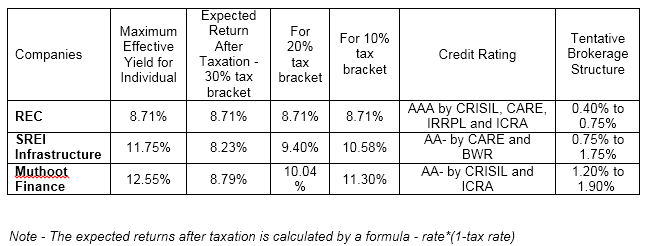Advisers say REC more suitable for those in higher tax-bracket and SREI for those in lower tax-brackets.
With SREI, REC and Muthoot Finance have recently come out with their non-convertible debt issues; other firms like HUDCO and IIFL likely to hit the bond market later this month as both companies had filed draft offer documents with SEBI to issue Non-Convertible Debentures (NCDs).
While REC’s Non-Convertible Bond (NCB) is offering tax free yield up to 8.71% per annum to retail investors, SREI and Muthoot Finance have announced attractive coupon rate of 11.75% and 12.55% per annum respectively to individual investors.
At this juncture, many financial advisers prefer to recommend tax free bonds of REC as they believe that advisers should keep security, taxation benefits and credit rating of an issue in mind rather than just its effective yield before recommending it to clients.
Karthik Jhaveri of Transcend Consulting advises REC’s bonds to individuals falling under 30% tax bracket. “Since interest from NCDs is added to annual income of an individual for taxation, it’s better to recommend REC’s tax free NCB to people in the higher tax bracket. However, for individuals with low tax bracket (10% to 20%), secured NCDs either of SREI or Muthoot makes sense as it would offer optimal returns even after taxation.”

Meanwhile, some financial advisers strike a cautious note on credit risk . “Companies having dependency on single business like Muthoot Finance (gold loan) carry credit risks over companies with good track record like SREI or companies with diversified businesses like Shriram (finance, transportations etc.),” says Nikhil Kothari of Etica Wealth Management. He believes that advisers should go through fundamental aspects of company’s business before advising their clients irrespective of commissions offered. According to him, tax free bond of REC is a good option for retired or a person who is close to retirement. Ritesh Sheth of Tejas Consultancy too suggest recommending NCBs of PSU firms like REC as such issues ensure tax free returns with high credit ratings.
So far, two companies – SREI Infrastructure and Shriram Transport Finance have collected Rs 869.59 crore from their NCD issues in FY 2013-14. Experts believe that some more tax free bonds are likely to be floated in the coming months.




